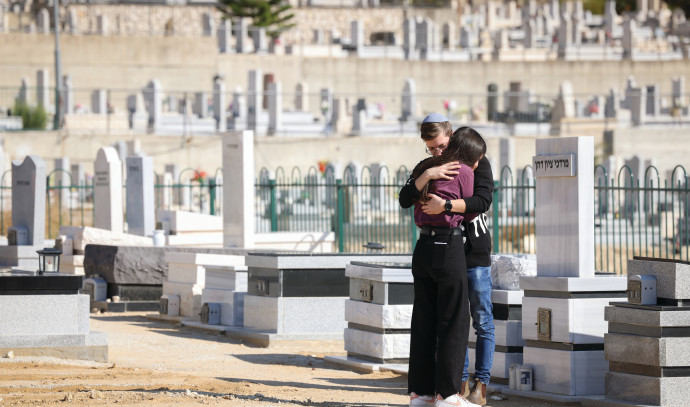It is hard to believe that we are well into the second week of the war already.
Time passes – painfully slowly, and at other times very quickly. We have moved to living our lives in between sirens, but live is what we must do. We are incredibly resilient, and we must carry on.
I saw that resilience this week in the people I visited who were displaced from the South, from the first responders I worked with, families of those held hostage, and sadly in shiva (mourning period) visits.
We are an amazing country. We will win this war. We are fighting for our very existence.
To say that it has not been easy is an understatement. We have all been shocked, angry, sad, and scared. We are dealing with the harsh reality of the situation, for both ourselves and those we care so deeply about. Our loved ones have gone to fight, are perhaps still missing, or more sadly, we may be sitting shiva for them. We will fight this together, and we will process it all together when it is over. Now, while we are still in it, our best coping strategy is to be in the moment.
Last week in my column, I provided a list of symptoms commonly seen when under acute stress. For some of you, these may be changing now as your disbelief and numbness diminish. Sadly, nothing feels too shocking anymore.
In this column, I will answer some questions I have been asked, and invite you to send in more.
1. What activities can I do with my children to help them understand and feel reassured right now?
Your children’s understanding will depend on their age and stage of development, as well as their involvement in the situation.
Nonetheless, even very young children will sense the change of rhythm in the house, the tension in your voice, decreased eye contact, and distraction. As a result, they may be clingier and more irritable, and you may find yourself feeling increasingly less patient, along with having more to do at home.
If you are stressed (and who isn’t?), you may want to invite a teenager over to help entertain your kids and enjoy, albeit briefly, an extra pair of hands. He or she may be a welcome distraction for your children and will most likely be more entertaining and pleasant to be with than you. At some point, your children will still want and need to be with you.
For now, your reassurance may come in the form of hugs, kisses, and simple explanations. Telling your child that “Abba is a soldier and will be home as soon as he can” may be all that is needed. You could make a sticker chart for your children to add stickers or pictures to a calendar for each day that goes by. You may also want to write in something that your children did that they’d like to tell Abba about.
Older children will obviously need more details. Again, your goal is to be honest and keep it light. They will benefit from your reassurance that you and others are looking after them. If they ask questions that you don’t have answers for, it is important to let them know that.
Right now, given that none of our nervous systems are feeling completely calm, if you sense your children are stressed, do some easy breathing exercises with them. They work wonders for all age groups and help empower children when they can take these tools with them wherever they go. If you or your children have been cooped up inside, open the windows and let in air. As safety conditions permit, go outside and into nature, even if it’s only for a short walk. Take along some bubbles, and just have fun.
We don’t have to be in war mode 24/7. Play dates too are good, and normalizing as much as possible will greatly impact your mood. Children, as well as adults, with no shortage of pent-up energy, may be surprised to discover how good it feels to dance or sing. There are some great exercise videos that are fun for everyone. Painting, making a collage, putting a puzzle together, and making cards for the soldiers are less strenuous ways to focus your energy.
As an adult, I sometimes play secretary and ask children to tell me a story which I will then write down. They often love to illustrate it, at times involving other siblings. Their stories may or may not be related to the current situation but just may give you added insight as to what they are thinking about and how they are coping.
Since children typically don’t focus on issues 24/7 in the same way as adults, they may visit and revisit aspects of their current situation in between their play. They may also seem indifferent to what is going on. This is normal.
While children of all ages may be on their screens a bit, or even a lot, more, it may offer you a much-needed break. While we want to try and keep well-established routines, it is important to acknowledge that everyone is in survival mode to some degree. It may be that these “treats” are reserved as a reward for completing schoolwork or other tasks.
Older kids will need to chat with their buddies, but you may be the one to hear their fears. While we may not have answers, let them know what works for you.
2. What strategies can help my children pay attention in school?
We all are more distracted than usual. Routine is important, and after such a long break for the holidays and now the war, I can understand your feeling of “let the learning finally begin.”
Young children may need some help all over again in adjusting to the new/old routines, but within a short time it should feel good to have some much-needed structure. Some children, given their situation at home, may take more time to adjust and may be more distracted. Fidget gadgets may help them to displace their energy.
More important right now than actual work (although it is important) is ensuring that kids and adults have a safe place to express their feelings. When they do get back into schoolwork, don’t forget to check in to see how it is going and what their teacher thinks.
3. What do I say or not say to those who are grieving?
Let me start by telling you what not to say. People are grieving for things both small and large. There are so many losses right now. For one person, it is the inability to go outside, see people, and go to work. Another may have a child or spouse in the army who they barely get to speak to. And another may have buried a family member or has someone who is missing and little information is known.
Each loss is very individual, and one can’t say whose is worse. You don’t walk in someone else’s shoes. Do not say you understand how someone feels or what he or she must be going through. Trust me, you could never understand.
Your goal is to be there, to listen, and to let them talk, if they choose, without interruption.
If it is appropriate, ask what you can do to be helpful. They may not be able to think. Offer ideas that you can execute, such as “Let me do your wash”; “I’m bringing dinner”; “I will pick up the kids, walk the dog.”
4. How do I re-jig my thinking?
It is so hard for me to be at all optimistic when I see everything that is going on right now. I will add that as a couple, we are more stressed than ever.
Listen to your own self-talk. If it is negative, reframe it. Instead of saying “I can’t,” try to say “I can.”
Now note five things that you are grateful for, in spite of the war, that happened yesterday. They don’t have to be big things. In fact, the smaller and more difficult it is to notice, the more you may appreciate them. Write them down and ask your children what nice things happened for them yesterday and what they appreciated.
I just came from a shiva that was packed. The sister of the deceased said she heard so many beautiful things about her brother and how he impacted others in ways she did not even know. You, too, can find a way to see the positive.
While your go-to may be “This is so horrible, we are never going to get out of it,” this approach will definitely not help anyone, especially you. We all have so much to be grateful for in spite of the horrific situation. We don’t have control over the package we are given in life, but we do have control over how we choose to let it affect us and how we deal with it. You have a choice: You can choose to be negative, or you can choose to be positive.
Personally, I am a lot more content when I choose the latter. My nervous system is also a lot calmer when I focus on the here and now and just making the most of the moment. In this moment, even if I am somewhat more anxious or stressed, I really am okay, and it is crucial to remind myself of that.
While there is no shortage of anger, given all that has happened, at this moment it will not take you anywhere. Questions such as “Why and how could this have happened?” are much less helpful than “What can I do about it?”
The answer is: a lot. You can help out in just about any capacity that you might choose. And this will help you put a more positive spin on things. Those who are volunteering are tired but appear to be coping well. They are goal-focused. Instead of deep soul searching, which is unhelpful and too soon at this time, they are busy helping and being there for others.
It is key to take breaks from volunteering in order to refuel. You’ll need to save your energy. If you are in a stressful situation, make sure that you talk with someone. People who do best in adverse situations are usually those who have worked to “build good” around the bad, so that with time “the good” seems to grow even bigger and bigger around our losses.
Being active takes you out of a state of helplessness and hopelessness, and gives you a sense of control. It helps you to put a positive spin on a situation and works to make meaning out of a difficult situation. Whether you are baking cookies or taking on some of the many jobs that are not being filled because our soldiers are not at home, there is a lot you can do.
The way that this country (and outside of Israel as well) has mobilized and come together to do anything and everything that is needed is simply beyond belief. Reading stories to a young child to give the mother a break, running errands, collecting and delivering essential items for soldiers or displaced families, and volunteering in an evacuation hotel all help to put an appreciative smile on the faces of others. The youth have been absolutely amazing and are phenomenal role models for us adults.
While you cannot control the thoughts that come up, you can control what you do with your thoughts. You may need help to learn how to actively “file those thoughts away” for a later day. When they resurface, with time it gets easier to file them away and ignore them. This technique can help greatly in reducing your sense of being overwhelmed, as it calms your nervous system and gives you a greater sense of control.
If you absolutely must worry, pick a time to do so. If you determine, for example, Tuesday from 5-5:15 p.m., remind yourself that outside of that 15-minute time period, your worry has to wait until your next selected time slot.
FINALLY, IT is important to do nice things for yourself. Whether it is to make a soothing cup of tea, relax with a book, or get a massage, these small treats help you refuel and maintain a small sense of normalcy in spite of everything.
As I have stated, trauma is an event that overwhelms the nervous system. Your job is to not allow yourself to remain overwhelmed. Remind yourself that the initial event – the immediate shock and horror – is in many ways over.
Fear serves as a reminder to be alert to danger, but as the danger diminishes we need to find a way to have our thoughts, feelings, and actions work in tandem with the actual situation in order to reduce our fear. If not, your body acts as if it is still in danger, you will not feel calm, and you may continue to catastrophize over the situation. When you are in a state of fight, flight, or freeze, your logical brain will not work to restore calm.
On the other hand, when you can ground yourself in the here and now and live your life in between events as best as you can, slowly assimilating the events that are going on around you, you can function quite effectively. As you remind yourself that in this moment you are okay, you will see the situation begin to slowly shift away from being acute, and you can reduce your perceived sense of danger.
There are two easy exercises that can help. First, notice how your posture may reflect how you feel. Slouch for a moment and notice a heaviness, dejection, and even a feeling of collapse. Now sit up tall. Imagine one vertebrae sitting high on top of the other down your entire spine. Notice how you start to look up and out instead of down or inward. Feel the strength in your body. Appreciate how quickly you can bring a state of relaxation to your body and a feeling of empowerment and strength.
A second exercise involves crossing your arms across your chest and holding onto your upper arms. Now begin to slowly tap – first on one arm and then the other. This butterfly hug is soothing and helps bring a sense of calm and logic back into your body. These exercises are easy to teach your children as well.
Remember, your job is to get through a situation that is changing daily yet continues to be ongoing. We will deal with things differently when this war is over. It will end. Again, while we had no choice, did not start this war, and are fighting with all our might, our attitude will be what strengthens us.
Looking forward to hearing from you and answering more questions.
The writer is a licensed clinical psychologist in private practice in Ra’anana and author of Life’s Journey: Exploring Relationships – Resolving Conflicts. She has written about psychology in The Jerusalem Post since 2000 and specializes in trauma, grief, and bereavement. [email protected], drbatyaludman.com



